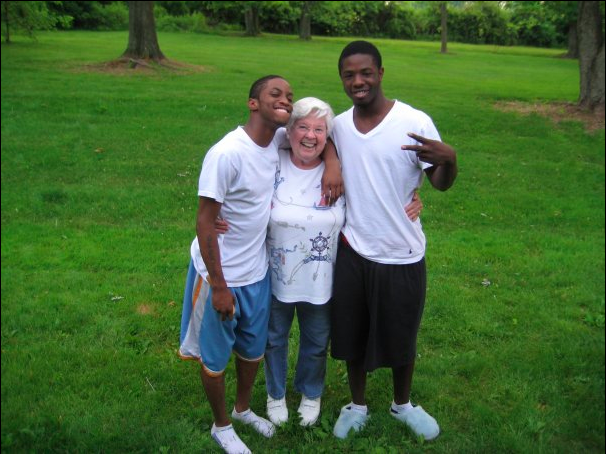Every so often, my children struggle with the “I am’s” of who they are. The “I am” of who they are currently, the “I am” of who others see in them, the “I am” of who they were, and the “I am” of who they want to be.
A few nights ago was one of those times.
So I had them draw a picture of themselves and then asked them, “When you look at yourself, what are five things you want people to say about you?” The clicking an clacking of crayons scribing little words and simple phrases instantly filled the dining room. I sat and watched. I listened. And I worked on my own.
My plan was to discuss the power of our actions because my kids, like many others, don’t want to be perceived as bossy, unkind, selfish, and so on. At times, however, their actions suggest otherwise, and I wanted them to understand that just because they think something about themselves doesn’t mean that is how they are perceived. Our actions define who we are, not our words.
As is often the case, however - at least in my family - the conversation took a turn and headed in another direction.
“I’m cool,” and “fun” Zion wrote, asking how to spell every word.
“Try sounding them on your own,” I said. And she did, adding, “Tuf, butiful,” and “nis.”
“Artistic,” Eden wrote in pink, then, switching to purple, “beautiful, athletic, nice.” She struggled a bit for her fifth. After a few minutes of thought, she witched back to pink and wrote, “funny.”
Judah’s were written in gray, “not ugly, nice, humorous, somewhat athletic, kinda smart.” With a black crayon, I crossed out “not ugly” and wrote “handsome,” but he didn’t like that. I also crossed out “somewhat” and “kinda,” and that really frustrated him, “You asked my for my opinion, and this is what I want!”
“Why though?” I asked, knowing he was struggling a bit in school with identity and feeling a bit on the outs, “Why do you only want to be kinda smart or somewhat athletic?” I pointed to my black markings, “Why don’t you want to be handsome?”
“Because I don’t want to stand out,” he said, tears beginning to swell in the corners of his eyes, “I don’t want everyone to notice me.”
My initial plan of discussion began to change course. Eden and Zion stopped coloring and looked at their older brother.
“What’s so wrong about being noticed?” I asked.
“I just don’t like it,” he said, and my father-heart broke.
“Comer here,” I said, grabbing the crayons and placing them back into the bucket. “Come sit with me for a minute.” We walked to the living room. He sat on the oversized chair and I sat on the floor, arms across his lap. Eden snuggled in next to me, as she has come to do in recent months, just to listen. Zion kept coloring for a while, then headed off to play dog with her younger brother.
“You’re a Miller,” I said to Judah, “And that means when we do something, whatever is, be it sport, school work, yard work, coloring, whatever, we do our very best.”
“But why can’t I do my best and not be the best?” he asked, tears still on the brink.
“Why can’t you be the best?” I asked, feeling a bit of frustration welling in my stomach, “What’s wrong with that?”
“Because I don’t want to be arrogant. I don’t want to think I’m better than everybody else.” A tear lunged down his cheek.
“Why does being good mean you have to think you’re better than everybody else?” I asked, somewhat knowing the answer.
He shrugged his shoulders, “It just always seems that way.” Faces of kids Judah has grown up with flashed through my head. Kids who were talented in various areas but also selfish and unkind to most everyone who wasn’t up to their standards.
“It doesn’t have to be that way,” I said, “You can be both great and nice?”
“Why does it matter?” Judah asked, “Why can’t I just be good? Why do I have to be great?”
Eden held her knees, Judah shifted in his seat, and I felt a heat flash through my neck and up through my face, This isn’t working I thought to myself, I don’t even know what I’m trying to say.
Quotes from inspirational books clogged themselves in my throat. They tasted like acid. I swallowed them down.
“Because,” I said, stalling, thinking, and feeling completely lost. What am I doing? What am I saying? I held Judah’s hand, stared at the scar on his arm, and sat quietly. Eden leaned against my arm, Judah looked out the window, and my mind wondered quickly through the past few years. Suddenly, hundreds of thoughts and memories and moments began to flood my head, of Judah and Eden struggling with identity and confidence, of them believing most everything they do isn’t good enough, that their gifts and talents and thoughts have little worth; that they’re “different.” An answer began to form.
It’s funny how our brains work, how they can take milliseconds to work through years of images and emotions, how it can tie them together in a single linear story with crisp and sudden clarity, and then suddenly produce an intelligent (or, at the very least, coherent) thought.
“Judah,” I said, the thought beginning to take shape, “I don’t want you to be great for your sake, so that you can get the glory and praise. I want you to be great for other people’s sake.”
“What do you mean?” he asked. Eden lifted her head from my shoulder.
“Let’s say you had a hundred dollars in your wallet, but because you hadn’t looked for a long time, you only thought you had twenty.”
He looked at me skeptically, with a look that said, “I would never forget that I had one-hundred dollars.”
“I know,” I said, “But just pretend, okay?”
He nodded. Eden began to chew her nails.
“So you have a hundred but only think you have twenty, and I come home from work, stressed and terrified because I had miscalculated our budget and now we were a hundred dollars short and our heating bill is due in a few hours. You hear Mom and I talking, and as you press your ear to the door to hear more clearly, you catch me saying, ‘If I don’t pay it soon, they’re going to shut off the power and we won’t be able to heat the house.’”
Judah’s eyes widen slightly because with almost two months of below freezing temperatures, he knows what that means.
“So you run over,” I continue, “and say, ‘Dad, I have twenty dollars you can have,’ and you hand it to me with joy in your heart, knowing you can help.” His eyes stay with me and I know he’s tracking along. “And I take it, grateful and joyful that my son is so willing to give and to love our family, but I know it isn’t enough. That although the gesture is sweet and beautiful, it doesn’t really matter because we’re still far from paying the bill and soon, everyone will be freezing cold.” Judah nods and Eden, still against my arm, stares.
“But if you had known that you had one-hundred dollars instead of twenty,” I continue, “you could have helped fully and completely. You could have paid the bill for us and everyone would have been nice and warm, right?” And he nods again.
And that’s just where I need him to be.
“We don’t pursue greatness so we can bring honor and praise to ourselves,” I tell him, holding his thigh and looking into his eyes, “we pursue greatness because it allows us more and greater opportunities to help more people. If you have one-hundred dollars but only think you have twenty, you can only provide twenty dollars worth of help. But if you have a hundred, if you can look in the mirror and say, ‘I’ve worked really hard and now I have a hundred dollars to give away,’ think of how much more you can bless others?” He nods again.
“But Judah,” I say, holding his hand and wrapping the other around Eden, “and Eden, you both have some amazing gifts. They need to be worked on and refined for sure, but you have amazing gifts. You’re healthy, your smart, your athletic, your artistic, and a million other things - you are truly gifted and talented kids. But right now, you believe you only have twenty dollars in your wallet, which means you are losing chances to truly help and bless others.”
They both nod.
“And that’s why I want and care about you being great,” I say, “Not because I want you to be popular or praised, but because I want you to serve and help as many people as possible. I want you to make a huge difference. Does that make sense?”
“Yes,” Eden says. Judah nods, as he tends to do when he truly gets something.
“Good,” I say, now go give your mom some hugs and then brush your teeth.” They scamper off, racing and pushing and arguing, like they do every. single. night. Then, they come to me, wrap their arms around my waste, say, “I love you,” and turn for their bedrooms. “Judah, Eden,” I say. They turn in unison, “You’re worth one-hundred thousand dollars, not just a hundred.” They smile and turn and race to bed.
That’s why we become great. So that we can help others. So that we can make a difference. And that is what so many kids - so many people - are missing. In service of others, that’s where we find our worth, our purpose, and our hope within this mess of life. Not in spending more time loving ourselves.
We each have a great a mighty worth. What a blessing it is to discover unique and exciting and sometimes simple ways to give it away.
For more on . . .






